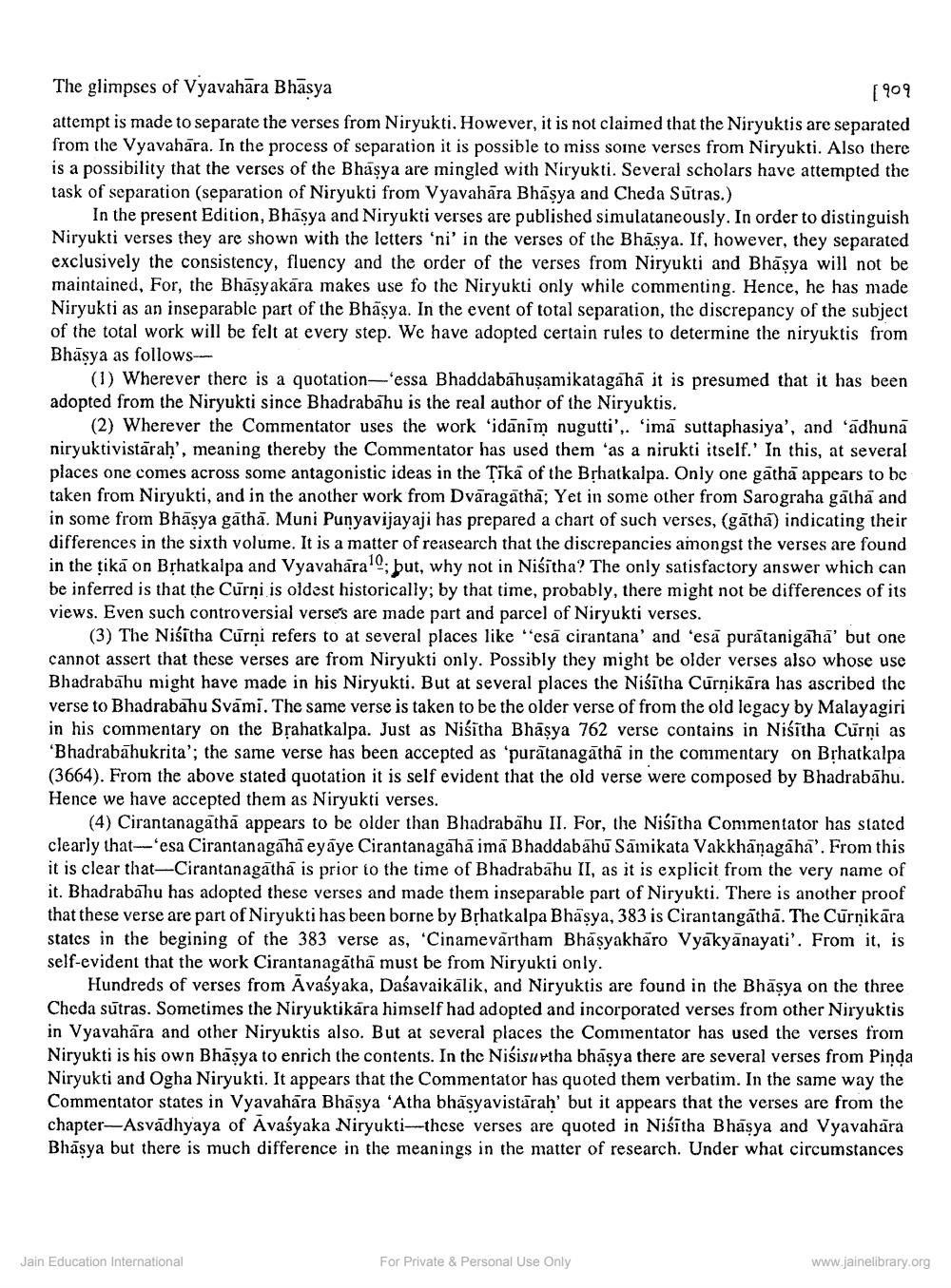________________
The glimpses of Vyavahāra Bhāsya
1909 attempt is made to separate the verses from Niryukti. However, it is not claimed that the Niryuktis are separated from the Vyavahāra. In the process of separation it is possible to miss some verses from Niryukti. Also there is a possibility that the verses of the Bhasya are mingled with Niryukti. Several scholars have attempted the task of separation (separation of Niryukti from Vyavahāra Bhāsya and Cheda Sutras.)
In the present Edition, Bhasya and Niryukti verses are published simulataneously. In order to distinguish Niryukti verses they are shown with the letters 'ni' in the verses of the Bhasya. If, however, they separated exclusively the consistency, fluency and the order of the verses from Niryukti and Bhāsya will not be maintained, For, the Bhasyakára makes use fo the Niryukti only while commenting. Hence, he has made Niryukti as an inseparable part of the Bhāsya. In the event of total separation, the discrepancy of the subject of the total work will be felt at every step. We have adopted certain rules to determine the niryuktis from Bhāsya as follows--
(1) Wherever there is a quotation-essa Bhaddabah uşamikatagahā it is presumed that it has been adopted from the Niryukti since Bhadrabahu is the real author of the Niryuktis.
(2) Wherever the Commentator uses the work 'idānim nugutti',. 'imā suttaphasiya', and 'ādhunā niryuktivistārah', meaning thereby the Commentator has used them as a nirukti itself.' In this, at several places one comes across some antagonistic ideas in the sīkā of the Brhatkalpa. Only one gathā appears to be taken from Niryukti, and in the another work from Dvāragatha; Yet in some other from Sarograha gātha and in some from Bhāșya gāthā. Muni Punyavijayaji has prepared a chart of such verses, (gātha) indicating their differences in the sixth volume. It is a matter of reasearch that the discrepancies amongst the verses are found in the tikā on BỊhatkalpa and Vyavahāra''; but, why not in Niśitha? The only satisfactory answer which can be inferred is that the Curņi is oldest historically; by that time, probably, there might not be differences of its views. Even such controversial verse's are made part and parcel of Niryukti verses.
(3) The Niśitha Cūrni refers to at several places like "esā cirantana' and 'esā puratanigaha' but one cannot assert that these verses are from Niryukti only. Possibly they might be older verses also whose use Bhadrabahu might have made in his Niryukti. But at several places the Niśītha Curnikāra has ascribed the verse to Bhadrabahu Svāmi. The same verse is taken to be the older verse of from the old legacy by Malayagiri in his commentary on the Brahatkalpa. Just as Niśītha Bhāsya 762 verse contains in Nišitha Curni as 'Bhadrabāhukrita'; the same verse has been accepted as 'purātanagātha in the commentary on Brhatkalpa (3664). From the above stated quotation it is self evident that the old verse were composed by Bhadrabāhu. Hence we have accepted them as Niryukti verses.
(4) Cirantanagathā appears to be older than Bhadrabahu II. For, the Niśitha Conimentator has stated clearly that-esa Cirantanagahā eyāye Cirantanagaha imā Bhaddabahu Samikata Vakkhanagaha'. From this it is clear that-Cirantanagātha is prior to the time of Bhadrabāhu II, as it is explicit from the very name of it. Bhadrabahu has adopted these verses and made them inseparable part of Niryukti. There is another proof that these verse are part of Niryukti has been borne by Bệhatkalpa Bhasya, 383 is Cirantangātha. The Curņikāra states in the begining of the 383 verse as, 'Cinamevārtham Bhasyakhāro Vyakyānayati'. From it, is self-evident that the work Cirantanagāthā must be from Niryukti only.
Hundreds of verses from Avaśyaka, Daśavaikālik, and Niryuktis are found in the Bhāsya on the three Cheda sutras. Sometimes the Niryuktikara himself had adopted and incorporated verses from other Niryuktis in Vyavahāra and other Niryuktis also. But at several places the Commentator has used the verses from Niryukti is his own Bhāşya to enrich the contents. In the Niśisuvtha bhāsya there are several verses from Pinda Niryukti and Ogha Niryukti. It appears that the Commentator has quoted them verbatim. In the same way the Commentator states in Vyavahāra Bhāsya 'Atha bhāsyavistārah' but it appears that the verses are from the chapter-Asvādhyaya of Avaśyaka Niryukti--these verses are quoted in Niśītha Bhāsya and Vyavahāra Bhāsya but there is much difference in the meanings in the matter of research. Under what circumstances
Jain Education International
For Private & Personal Use Only
www.jainelibrary.org




